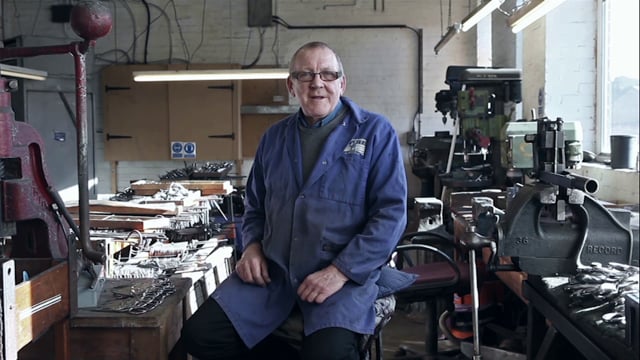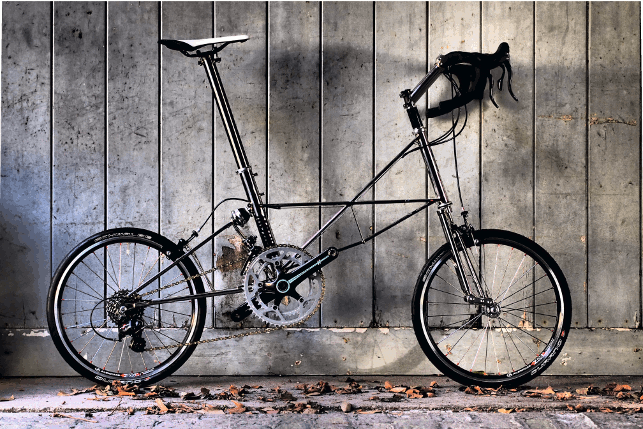
One of the newer models in Moulton Bicycle’s range is the SPEED. Despite being a full-suspension road bike it only weighs in at 9.1kg. The spaceframe design is constructed entirely from stainless steel with every joint silver-brazed and the entire frameset hand polished
You’ve been framed
The small-wheeled, full-suspension Moulton bicycle has been hand-built in the UK for 53 years.
It was invented by Dr Alex Moulton CBE who also invented rubber- and gas-sprung suspension units found in over 12 million British cars from the original Mini to the MGF.
Inspired by his background in aeronautical and automotive engineering, Moulton’s design flew in the face of conventional bicycle design with its small wheels, suspension, stiff unisex frame, adaptability and innovation in design.
He approached Raleigh, the biggest bicycle manufacturer in the UK at the time, with his prototype with a view to offering a licence to manufacture. Being refused, Moulton built a bicycle factory in the grounds of his Bradford-Upon-Avon home and launched the Moulton bicycle to great success at the Earls Court Cycle Show in 1962.
Today a small team of eight craftsmen, one of whom has been there since 1962, still work in this factory hand-brazing the frame and forks as well as making a number of parts, including the suspension.
Alex Moulton continued to evolve his bicycle designs right up to his death in 2012 at the age of 92.
“Many people who buy a Moulton bicycle now don’t buy them to ride but rather to hang on their wall. Alex Moulton created something that was really a work of art without intending to and we really feel the responsibility for that.
We are only a small team but we have been fortunate to work with him and to learn from him,” says Dan Farrell, technical director of the Moulton Bicycle Company.
“Some of the geometric relations that make the design look so good had disappeared from his newer designs but referring back to his original drawings, I’m starting to put these back in.”
Unlike Moulton, who did all his drawings by hand, Farrell uses SolidWorks in his design process.
“We like how we can model things like rubber and do wheel simulations. Also, clash testing is very useful.”
MOULTON BICYCLE COMPANY – MADE IN ENGLAND from WellPlastic Films on Vimeo.
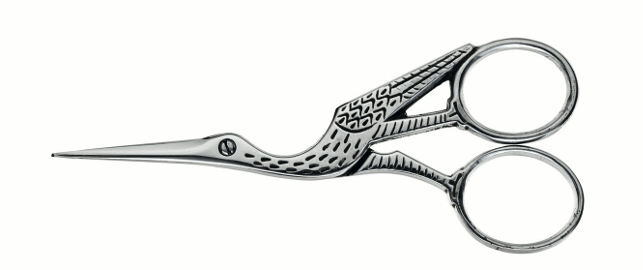
Ernest Wright and Son’s ‘Antique Pattern’ Stork embroidery, needlework and thread scissors is one of its best selling products retailing for £25.20
What a steel
Once a thriving industrial town, Sheffield was home to over 150 small scissor manufacturing companies.
Today one of the last to remain is Ernest Wright & Son, a family owned company established in 1902.
With over 150 scissors in its range, it has a pair suitable for just about any application, and each is hand made using traditional techniques and skills.
In fact, it takes five years as an apprentice to qualify as a ‘scissor putter-togetherer’, a title still used for the company’s craftsmen today.
The process begins with hot-forged stainless or carbon steel ‘blanks’. Each ‘half’ of a pair is hardened and tempered in furnaces and quenched in oil. The blade is then hand-ground on a traditional saddle-mounted grinding wheel before it’s polished and assembled by the putter-togetherers.
“We are just in the process of getting several of our more unique traditional item forge-patterns 3D scanned and turned into CAD files, in case we ever need to order forgings for them again.
The local universities (Sheffield University and Sheffield Hallam University) are involved in these projects,” explains Nick Wright, managing director.
“Our real pride is in the traditional methods we use to make our scissors, but I see opportunities to move into CAD/CAM, CNC milling and even possibly 3D printing for a future range – even if to complement, and not actually replace, the traditional methodology.”
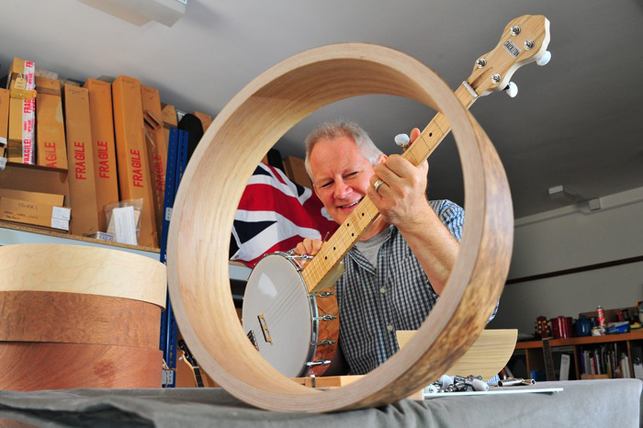
Launched in 2013, The Great British Banjo Company design and manufacture its instruments from scratch
Take your pick
The Great British Banjo Company is a relatively new company founded by Simon Middleton in Norwich with the aim of manufacturing banjos from scratch.
Its first instrument, launched in 2013, was the Islander Ash Leaf open back, which has been superseded by the Shackleton Islander.
“The Shackleton Islander model is our most luxurious instrument inspired by classic open back banjos from the southeastern United States, but with a particularly English take,” describes Middleton.
The banjo design process begins with sketches. These become technical drawings which are then turned into carved prototypes.
“There is a lot of hand-making in our products. Some of our instruments are made entirely by hand whilst others use CNC to cut out the necks, but we are moving away from CNC to use hand-controlled tools. The Shackleton Islander doesn’t use CNC at all.”
Wood is sourced from an East Anglian FSCcertified timber merchant and all the wooden components are made in the factory. The remaining components are outsourced with the build and finishing process completed in-house.
“Our instruments do involve a huge amount of handcrafting, and even when we use powered tools the result is dependent on the skill levels of the craftsman. This means our instruments are more expensive than imports but we offer a six year warranty and many of our instruments, like the Islander model, will actually increase in value.”
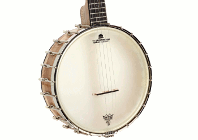
A look at three products that are designed and hand-built in the UK
Default

